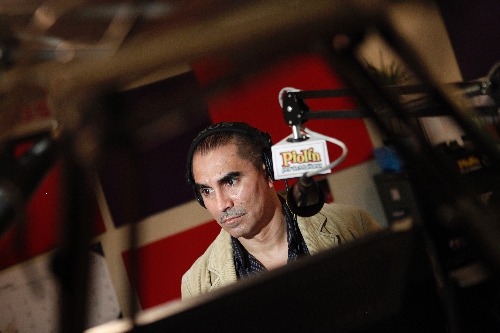Singer Jenni Rivera mourned in Las Vegas, revered as great talent
Jenni Rivera, the famous Mexican-American singer whose remains were officially identified Thursday, left quite an impression on Las Vegas.
She has a star right alongside the greats such as Elvis Presley and Dean Martin outside the MGM Grand.
She performed at Mandalay Bay during the Latin Grammys in November, where one of her albums was nominated for best in banda but didn't win.
And in the past decade, in her late 30s and early 40s, she sold out countless shows at casinos as more and more Latinos showed up to hear her brand of music - and to listen to her beautiful, booming voice.
She had long been dubbed "La Diva de la Banda."
"La Banda" means "the band" in Spanish. But, really, it's a type of music that has existed for decades in Mexico.
With an assortment of brass, woodwind and percussion instruments, it's not too distant from mariachi - and there is no doubt that it has had major German-polka influence.
The music used to be admired by the older generations. But it took off in the 1990s, after lying relatively dormant for years.
Spanish radio stations in Los Angeles played a major role in resurrecting it, playing it constantly on the airwaves.
Jesus Garcia, a program director for KLAX-FM in Los Angeles at the time, was one of one of them. These days, he is at La Nueva, 103.5-FM, one of seven Spanish-language radio stations in Las Vegas.
"We took a chance by playing it," Garcia recalled about Los Angeles. "Everybody was either playing Mexican pop or salsa or merengue, but we were looking for something different, something from the old country."
Mexican immigrants, longing for something from Mexico, embraced the music. According to Garcia, the music became so popular that every day there would be long lines of people waiting to just get a tour of the radio station itself.
"I'm talking about 500 people at a time, just lined up to pass through the doors to take a look at where all the music was coming from," Garcia said. "It was huge."
Garcia wasn't too far from Rivera when this surge in popularity was taking place. The California native lived in Long Beach at the time. And her father, Pedro, owned a record label in Los Angeles. Eventually all their paths crossed, and they became close friends.
It was after this sort of exposure that Rivera took up the microphone, becoming one of the first women to sing in an otherwise male-dominated musical scene.
"It was just unthought of," said Garcia. "Women just didn't do this sort of stuff. The singing was mostly left up to the men. That was just the tradition."
Not anymore.
Rivera died in an airplane crash over the Mexican state of Nuevo Leon at age 43 on Sunday, but she lives on in her music, he said.
She was also the mother of five children. She endured three marriages, the first one at the hands of an alleged abuser, the details of which she held little back, either in personal anecdotes or in song.
It was no surprise that many of the testimonials played on the seven Spanish radio stations in Las Vegas have been honoring Rivera, not only as singer and performer, but as single mother - a single mother who grew up poor.
And yet she always had time for the fans.
"She was just that type of person," said Benjamin Ayvar, a DJ for La Buena, 101.9-FM, another Spanish-language radio station in Las Vegas. "She didn't have it easy growing up. She had to work for what she got. So I think she remembered this when she was dealing with the fans. She always had time for the fans."
Now her fans can remember her. Just as she would like them to. As she sang in "Cuando muere una dama," or "When a lady dies."
In it, she tells mourners to hold "a final party" and to remember her smile, and how she laughed. She sings about the tons of lovers she has had, and that they're all going to miss her when she goes. But it is the "love of her life," that is the one who's going to miss her most.
And as for her brothers and parents, she will miss them, too, but not for long. They will all someday be reunited in afterlife, where they can run free and laugh and remember the good times they had on Earth.
Contact reporter Tom Ragan at tragan@reviewjournal .com or 702-224-5512.



















